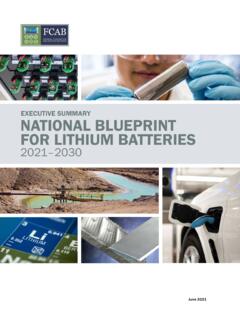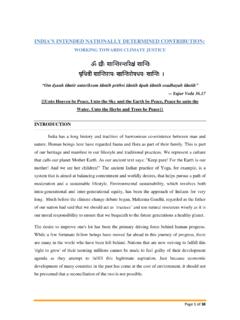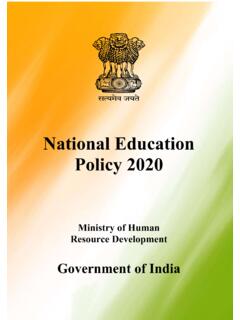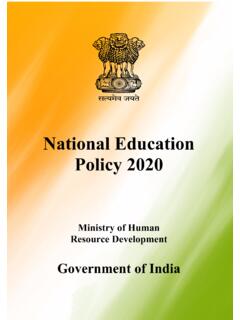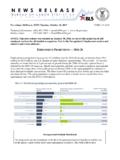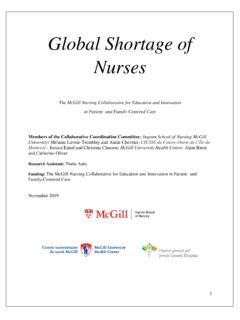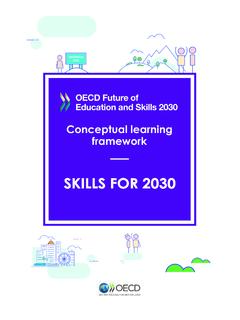Transcription of THE FUTURE OF SKILLS - Pearson
1 T H E FU T U R E O F S K I L L S. EMPLOY MEN T IN 203 0. Hasan Bakhshi Jonathan M. Downing Michael A. Osborne Philippe Schneider Research partners 1. Creative Commons This work is licensed under the Creative Commons Attribution-Non Commercial- ShareAlike International License. To view a copy of this license, visit http://. or send a letter to Creative Commons, PO Box 1866, Mountain View, CA 94042, USA. Questions for the authors Questions for the authors can be sent to: (Hasan Bakhshi). (Jonathan M. Downing). (Michael A. Osborne). (Philippe Schneider). Suggested reference Bakhshi, H., Downing, J., Osborne, M. and Schneider, P. (2017). The FUTURE of SKILLS : Employment in 2030.
2 London: Pearson and Nesta. Copyright 2017. The contents of this paper and the opinions expressed herein are those of the Authors alone. ISBN: 978-0-992-42595-1. T HE FUT URE OF SKI L L S: EM PL OYM ENT I N 2 0 3 0. ABOUT Pearson . Pearson is the world's learning company. We're experts in educational course ware and assessment, and provide teaching and learning services powered by technology. We believe that learning opens up opportunities, creating fulfilling careers and better lives. So it's our mission to help people make progress in their lives through learning. ABOUT NESTA. Nesta is a global innovation foundation. We back new ideas to tackle the big challenges of our time, making use of our knowledge, networks, funding and SKILLS .
3 We work in partnership with others, including governments, businesses and charities. We are a UK charity that works all over the world, supported by a financial endowment. To find out more visit ABOUT THE OXFORD MARTIN SCHOOL. The Oxford Martin School at the University of Oxford is a world-leading centre of pioneering research that addresses global challenges. We invest in research that cuts across disciplines to tackle a wide range of issues such as climate change, disease and inequality. We support novel, high risk and multidisciplinary projects that may not fit within conventional funding channels. We do this because breaking boundaries can produce results that could dramatically improve the wellbeing of this and FUTURE generations.
4 We seek to make an impact by taking new approaches to global problems, through scientific and intellectual discovery, by developing policy recommendations and working with a wide range of stakeholders to translate them into action. Twitter: @oxmartinschool Facebook: /oxfordmartinschool 3. T HE FUT URE OF SKI L L S: EM PL OYM ENT I N 2 0 3 0. CONTENTS. 7 EXECUTIVE SUMMARY 41 6 RESULTS. 42 Occupations 18 1 INTRODUCTION 42 US. 48 UK. 20 2 LITER ATURE REVIEW 52 Sensitivity analysis 20 Anticipating occupations and SKILLS 53 US. 21 Changing SKILLS needs 57 UK. 22 Labour markets and structural change 61 SKILLS 25 Overview of the trends 62 US. 67 UK. 29 3 APPROACH 72 Relative importance of SKILLS , abilities and knowledge areas 30 4 DATA.
5 74 Skill complementarities 30 O*NET. 74 US. 32 Employment microdata 77 UK. 32 Workshop-generated data 80 New occupations 80 US. 36 5 METHODOLOGY. 83 UK. 36 Gaussian processes 36 Heteroskedastic ordinal regression 87 7 LIMITATIONS OF THE ANALYSIS. 37 Active learning 37 Assessing feature importance 89 8 CONCLUSIONS. 38 Pearson correlation 38 A verage derivative and 91 Appendix A. feature complementarity Sensitivity analysis 39 New occupations 95 Appendix B. 39 Trend extrapolation Overall rankings of minor occupation groups, US and UK. 99 Appendix C. SKILLS ranking by average derivative, US and UK. 103 Appendix D. UK US occupation crosswalk 113 REFERENCES.
6 118 TECHNICAL TERMS GLOSSARY. 120 ENDNOTES. 5. ABOUT THE AUTHORS. Hasan Bakhshi leads Nesta's creative economy policy and research and data analytics. His work includes co-authoring the Next Gen SKILLS review of the video games and visual effects industries, which led to wholesale reforms of the school ICT and computing curriculum in England, and the Manifesto for the Creative Economy, which sets out ten recommen- dations by which governments can help the creative economy grow. Bakhshi is a member of the Royal Economic Society Council, the Senior Management Team at the Economic Statistics Centre of Excellence (ESCoE) supported by the Office for National Statistics (ONS) and the Expert Peer Review Group for Evaluation at the Department for Business, Energy and Industrial Strategy.
7 Jonathan M. Downing is a DPhil (PhD) student in the Machine Learning Research Group at University of Oxford, jointly supervised by Dr. Michael Osborne and Prof. Stephen Roberts. His academic research focuses on the Bayesian non-para- metric, FUTURE of Work, and machine learning interpretability. Prior to starting his DPhil he completed a MEng Engineering Science at Keble College, University of Oxford. Michael A Osborne is the Dyson Associate Professor in Machine Learning, a co-director of the Oxford Martin programme on Technology and Employment, an Official Fellow of Exeter College, and a co-director of the EPSRC Centre for Doctoral Training in Autonomous Intelligent Machines and Systems, all at the University of Oxford.
8 He works to develop machine intelligence in sympathy with societal needs. His work in Machine Learning has been successfully applied in diverse contexts, from aiding the detection of planets in distant solar systems to enabling self-driving cars to determine when their maps may have changed due to roadworks. Osborne has deep interests in the broader societal consequences of machine learning and robotics, and has analysed how intelligent algorithms might soon substitute for human workers. Philippe Schneider is an independent researcher who has collaborated extensively with Nesta as a Visiting Research Fellow and consultant since 2007. He has carried out technical and policy work for a range of private and public sector organisations, including the World Bank, BlackRock, the African Development Bank, HM Treasury, BP, CISCO, British Academy and what is now the Department for Business, Energy and Industrial Strategy where he was Advisor to the Secretary of State on innovation policy.
9 He speaks and reads Chinese. ACKNOWLEDGEMENTS. We thank Logan Graham for his research assistance on coding and preparation of the O*NET and employment data and to Justin Bewsher for his contributions to the sensitivity analysis. We are indebted to Harry Armstrong and Wendy L. Schultz, and to those who participated in the two foresight workshops held in Boston, Massachusetts, and in London in October 2016. We are also grateful to the attendees of a dry run workshop in London who helped us refine the workshop exercises. Thanks also to Antonio Lima, George Windsor, Juan Mateos-Garcia, Geoff Mulgan and Cath Sleeman at Nesta and Laurie Forcier, Amar Kumar, Janine Math , Tom Steiner, Vikki Weston and other colleagues at Pearson for their encouragement, support and valuable comments on the findings.
10 Mark Griffiths played an important role in the inception of the study and provided valuable support throughout its implementation. Sir Michael Barber, Paolo Falco, Joshua Fleming and Carl Frey provided invaluable comments on an earlier draft of the report. We are also grateful to Rainy Kang for helping us track down data and Jessica Bland for her contributions in the early stages of the research. 6. T HE FUT URE OF SKI L L S: EM PL OYM ENT I N 2 0 3 0 EXEC U T I V E S U MMA R Y. EXECUTIVE SUMMARY. Recent debates about the FUTURE of jobs have mainly focused on whether or not they are at risk of automation (Arntz et. al., 2016;. Frey and Osborne, 2017; McKinsey, 2017; PwC, 2017).


